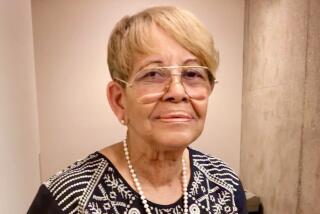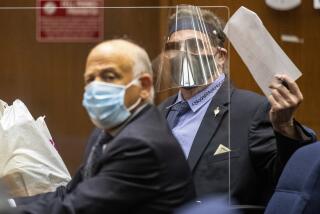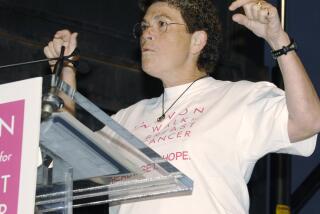Dr. Helen Martin, 100; USC Medical Professor, Pioneer in Diabetes Care
- Share via
Dr. Helen Martin, a pioneer in diabetes care and a longtime USC professor of medicine who was a role model for generations of medical students, has died. She was 100.
Martin died of natural causes Saturday at an assisted-living community for seniors in Pasadena, said Joyce Spence, Martin’s niece.
A childhood victim of polio who used a cane, Martin developed an early interest in medicine because she spent so much time in hospitals while growing up.
Despite her parents’ fears that the profession would be too physically demanding for her, Martin graduated from the USC School of Medicine in 1934 and became one of the nation’s most respected women in medicine -- as a physician, researcher and teacher.
During World War II, Martin became the dominant force of the USC clinical teaching program: After virtually the entire faculty -- members of the Army Reserve’s 73rd Evacuation Hospital unit -- were shipped to the India-Burma theater, she was the only remaining full-time faculty member.
“For about 3 1/2 years, she held that whole department together. How she did it I don’t know, but she did,” said Dr. Robert Tranquada, a former colleague who became the Los Angeles County Hospital’s medical director in 1969 and later dean of the USC School of Medicine.
But that was only one of her accomplishments, Tranquada said.
“Another was her basic research in diabetes, which early on was to look at the influence of electrolytes in the care of diabetic coma and serious problems of diabetes.”
Martin wrote numerous papers on the functions of insulin and electrolyte disturbances in diabetes and was an international expert in the role of magnesium in diabetes.
In the late 1940s, she collaborated with Dr. Robert Maronde in the creation of a homemade artificial kidney, which used a stainless steel beer keg as the reservoir.
But what Tranquada remembers most about Martin is her role as a teacher and mentor.
“The ethic that she taught to everybody was that the only reason the physician was there was to serve the patient; she would accept nothing less,” he said. “I think it was just a magnificent contribution to the lives of literally hundreds of students and residents who went through her program. She was a remarkable person.”
Born in Alameda, Calif., on May 15, 1906, Martin graduated from Hollywood High School in 1923. She earned her bachelor’s degree from Pomona College in 1927. Two years later, she entered the USC School of Medicine as one of five women in a class of 30.
After graduating in 1934, she completed the final year of a two-year internship at what was then called Los Angeles County Hospital. That was followed by 2 1/2 years as a resident in internal medicine.
In 1938, she became an instructor of physiology in the USC School of Medicine, where she taught until becoming an instructor of medicine in 1942.
Recalling her days during World War II when she was the only full-time faculty member in clinical teaching, Martin said in a 1996 interview with USC Health Magazine:
“We taught around the clock, summers as well as the rest of the year. There were times when we were short of interns at the hospital, and some of our students acted as interns, so I spent a lot of time seeing patients with these students during the war. I didn’t get much sleep during the war because people would call me up all night about problems.”
She frequently fielded late-night phone calls -- at her request.
“You were expected to call her in the middle of the night about problems when a patient came in,” Maronde said in the 1996 article on Martin. “She knew every diabetic -- she knew them all. I can remember some of the cases specifically that were problems, patients who kept coming in out of control -- wouldn’t take their insulin, their veins gone. You’d call Helen, and you’d get help, believe me.”
To provide balance to students’ years of medical studies, Martin later launched a popular humanities program in which she invited poets, actors, musicians, historians and others to weekly lunchtime sessions at the hospital.
Martin, whose former students recalled that she used her cane to point and occasionally would shake it when she disapproved of something, demanded excellence -- a trait that she always strove for herself.
“I really found medicine a fascinating career, and I can truthfully say that I got up every morning looking forward to going to the hospital because I never knew what was going to happen,” Martin, who never married, said in 1996.
After retiring in 1968, she spent more than six years compiling a history of Los Angeles County-USC Medical Center.
The 548-page volume, “The History of the Los Angeles County Hospital (1878-1968) and the Los Angeles County-University of Southern California Medical Center (1968-1978),” was published in 1979.
Martin was named the 2006 inductee of the Keck School of Medicine Wall of Fame in the lobby of the Keith Administration Building on the USC Health Sciences Campus.
Until she became ill recently, Martin remained lively, keeping up to date on medicine, news, politics and USC football. She also held a monthly book club for friends at her assisted-living community.
“She was sharp as a tack,” said Tranquada, one of the book club members.
In honor of Martin’s 100th birthday, a tribute book of letters from former students and faculty members was assembled for her.
Among the letters was one by Dr. Samuel K. Wirtschafter, class of 1957, who wrote:
“I think back today about the fear and trepidation I had concerning living up to the high standards she always insisted we have in the care of our patients. In doing this, she imparted to me the love, excitement and privilege of practicing medicine.”
More to Read
Sign up for Essential California
The most important California stories and recommendations in your inbox every morning.
You may occasionally receive promotional content from the Los Angeles Times.













